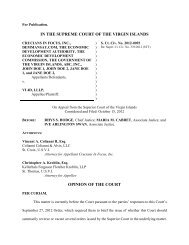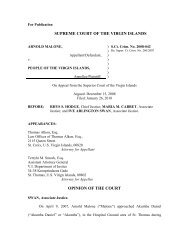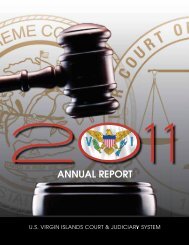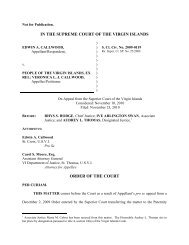IN THE SUPREME COURT OF THE VIRGIN ISLANDS OPINION OF ...
IN THE SUPREME COURT OF THE VIRGIN ISLANDS OPINION OF ...
IN THE SUPREME COURT OF THE VIRGIN ISLANDS OPINION OF ...
Create successful ePaper yourself
Turn your PDF publications into a flip-book with our unique Google optimized e-Paper software.
Watts v. Two Plus TwoS. Ct. Civ. No. 2007-0127Opinion of the CourtPage 8 of 10motion or at the September 18, 2007 hearing that any witnesses had actually become unavailableor had forgotten about the incident. Moreover, notwithstanding the fact that a defendant does notpossess an affirmative duty to ensure that a plaintiff prosecutes his case, the Superior Courtshould have considered—in the context of determining the extent of the prejudice—that TwoPlus Two did not request Watts’s initial Fed. R. Civ. P. 26 disclosures until May 5, 2007, did notfollow-up on its July 25, 2003 demand for documents until May 5, 2007, and did not attendBell’s November 16, 2006 deposition even though it had received notice. Under thesecircumstances, as well as the absence of any evidence in the record indicating that Two Plus Twowas actually prejudiced, the Superior Court lacked a factual basis to find that the prejudice toTwo Plus Two had been “substantial.” Therefore, while the second Halliday factor does supportdismissal because of the inherent prejudice Two Plus Two suffered as a result of the delay, itdoes so only slightly.Likewise, we find that while the Superior Court correctly held that the third Hallidayfactor—Watt’s history of dilatoriness—favors dismissal, 2it failed to properly weigh theimportance of that factor in light of the facts of the case. Although the record clearly indicatesthat Watts’s counsel failed to respond to the July 25, 2003 demand for documents or complywith the May 7, 2007 scheduling and mediation orders, it also established that Wattsimmediately complied with the Superior Court’s October 26, 2006 Order by scheduling Bell’s2 Although Watts argues that the trial court erred because it “failed to acknowledge Appellant’s counsel (sic)assertion that he had never received the Court’s scheduling order; even after counsel pointed out to the Court thatorders had not been received in several other pending matters, including orders from other chambers of the Court,”(Appellant’s Br. at 7-8), the record clearly indicates that the Superior Court’s orders were all sent to Watts’s counsel.(J.A. at 72; Supp. App. at 9.) Additionally, even if Watts’s counsel had not received a copy of the scheduling order,this order is expressly referenced in Two Plus Two’s May 5, 2007 letter, which had been sent to Watts’s counselthrough both mail and fax. (J.A. at 79.) Furthermore, while Watts’s counsel was aware that little or no action hadtaken place with respect to this matter for several years, the record does not reflect that he made any attempt tocheck the docket or follow-up with the trial court as to the case’s status. See Hobbs v. Wal-Mart Stores, Inc., No.CV-06-1031-PHX-PGR, 2007 WL 4510518, at *3 (D. Ariz. 2007) (observing that there is “no excuse” for anattorney or his staff not to check the docket to see if a scheduling order has been issued in a pending case).
















